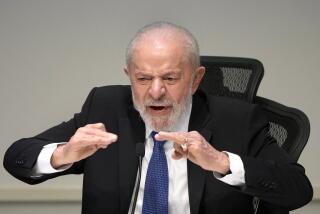Duarte Proposes Delay in Salvador Presidential Vote
- Share via
SAN SALVADOR — President Jose Napoleon Duarte on Sunday proposed delaying El Salvador’s presidential elections for six weeks as a response to guerrilla demands for a six-month postponement of the voting. He added that a national plebiscite might be necessary on a sweeping rebel peace plan.
In an unscheduled national radio and television broadcast, Duarte also said he is accepting a recommendation by the nation’s political parties that government officials meet with guerrilla leaders for direct negotiations on ending the country’s bloody, nine-year civil war. He suggested that the meeting begin Tuesday in Guatemala.
However, Duarte--who has previously rejected any delay of the elections, now set for March 19--set several conditions and was extremely vague on arrangements for carrying out his plan.
First, the Farabundo Marti National Liberation Front, the formal name of the Marxist guerrilla organization, must agree to an immediate cease-fire to accompany the Guatemala talks.
Then the FMLN, as the rebel group is generally known, must accept April 30 as the election date, not Sept. 15, as the guerrillas originally demanded when they began the current peace-seeking process with a surprise proposal last month.
In addition, Duarte said the National Assembly must ratify the delay. The Assembly is controlled by the ultra right-wing Nationalist Republican Alliance party. Arena, as that party is known, is favored to win the presidency and has rejected any postponement of the vote.
If the Assembly turns down the postponement, Duarte said, he would call for a national referendum on the FMLN proposal.
The original FMLN proposal called for a Sept. 15 vote, reform of the electoral process to guarantee the unfettered participation by leftist parties and the withdrawal of the army to its quarters on the day of the election.
In turn, the FMLN would actively participate in the electoral process and accept the results.
In a meeting last week between leaders of Salvador’s 13 political parties and leaders of the five rebel groups that make up the FMLN, the guerrillas added demands that the army be reduced from its current 58,000 troops to 12,000--the level that existed when the insurrection broke out in 1980--and the punishment of military members guilty of violating human rights.
The guerrillas said that if their conditions were met, they would declare an immediate cease-fire and begin dismantling their 7,000-member army.
Although Duarte’s broadcast created new momentum in a process that, for all practical purposes, was considered dead in light of his rejections of the FMLN plan as well as negative reactions by Arena and the army, there are reasons to doubt the workability of his proposal.
For instance, he left unclear when any plebiscite would be held and exactly what the people would be asked to vote on.
The initial reaction from some diplomats was that Duarte, who has been criticized for his previous rejections, made his proposal knowing it probably would be turned down by the FMLN, which made it clear in Mexico City that a delay to April 30 was unacceptable, or Arena, on grounds that a delay would be unconstitutional.
More to Read
Sign up for Essential California
The most important California stories and recommendations in your inbox every morning.
You may occasionally receive promotional content from the Los Angeles Times.













